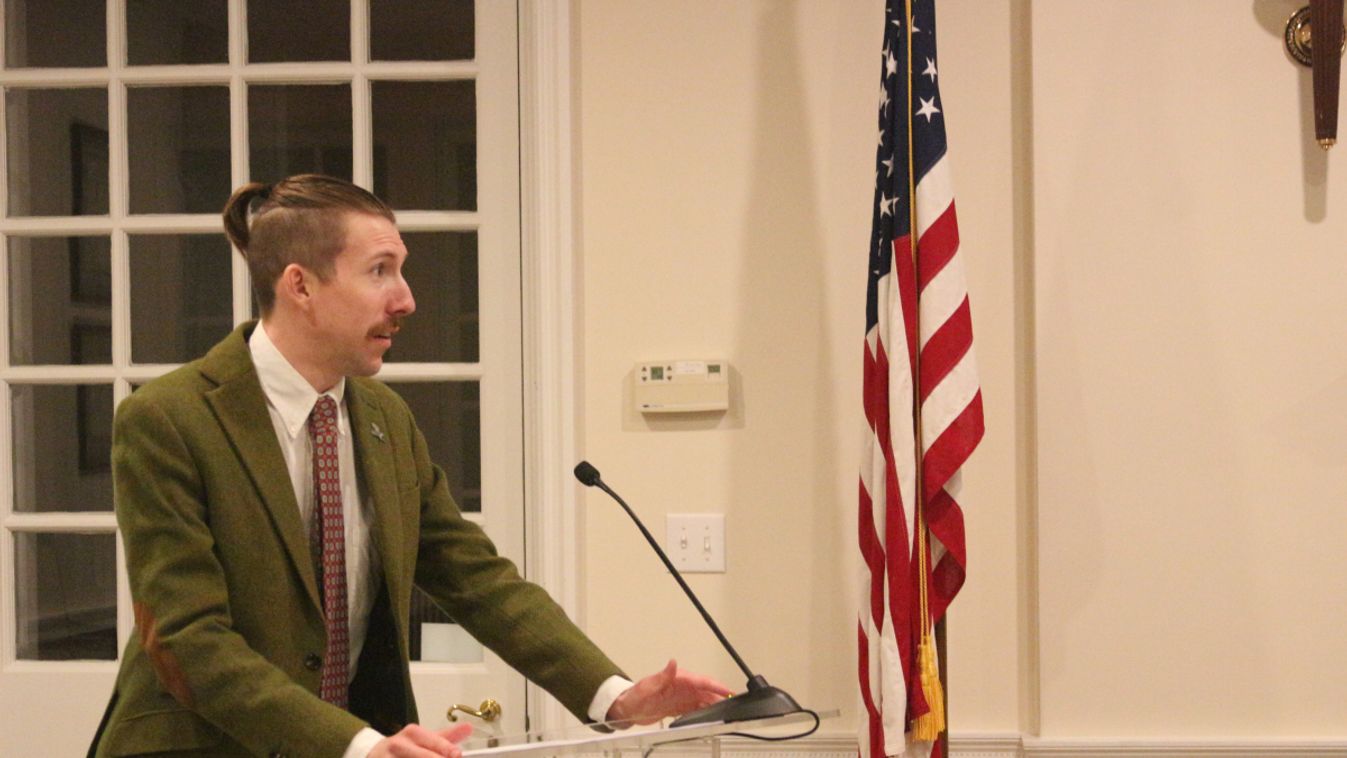Csak két perc: videón a legdurvább ukrán fenyegetések Zelenszkijtől a rettegett ukrán őrnagyig

Magyarország katonai megszállásától a választási eredmények megtámadásáig – minden belefér az EU-s csatlakozást követelő ukrán megszólalók szerint.

Government reliance on private speech controls to secure an orderly transition of power, or even the perception of such reliance, does damage to the state’s legitimacy. If private rather than state power ensures the security of the state, the state may be seen as subordinate to the institutions that protect it – Will Duffield, a policy analyst of CATO Institute pointed out in a conversation with Lénárd Sándor, researcher at the National University of Public Service.

We could witness how the Digital Revolution was unfolding in the course of the last century and how it has gradually become an everyday reality. What, in your view, are the major societal impacts of this phenomenon and how is it shaping societies throughout the World?

While analog broadcast technology privileged one-to-many communication, advantaging gatekeepers and elites, the digital revolution lowered the cost of speech and provided new forms of many-to-many communication.
Media has become more participatory, and old epistemic authorities face new competition.
However, the revelation of previously unheard or ignored discontent need not be seen as a threat to democracy. Instead, the velocity and scale of social media should be seen as an opportunity to perfect democratic feedback loops.
With the growing influence of digital communication and platforms, societies around the World moved from the era dominated by mass media towards a more individualized and customized information age. In addition to that, our deliberative activities have increasingly moved from in-person to online venues. What, in your view, are the benefits and shortcomings of this still ongoing shift?
The internet has made deliberation more inclusive. Dissenting voices and inconvenient facts can no longer be excluded from the public conversation.
While in the era of broadcast television, Walter Cronkite could define “the way it is,” digital communication has opened an endless frontier of speech.
Beyond marquee social media platforms, a vast ecosystem of digital publishing services has emerged to host even disfavored speech.
While analog media illustrated the dangers of centralized gatekeeping and uncontested narratives, digital communication risks fulminating balkanization and undermining the baseline of shared facts required for deliberation. At scale, it can be difficult to determine who is conversing in good faith, and easy to rely on partisan signifiers to dismiss those with whom we disagree. As democratic citizens, we must appreciate our newfound roles as media producers, and avoid retreating into comforting filter bubbles. Though the internet has made misbehavior or outrageous speech more visible, we should resist the urge to generalize from newly available anecdotes.
Does it mean that antitrust regulation and enforcement have a role in remedying some of the shortcomings?
To the extent that particular intermediaries or digital infrastructure providers become necessary to stay online, they will become magnets for political conflict. Ideologues of all stripes can see advantage in limiting their opponents’ speech. The best solution to these chokepoints is market competition and decentralization. Regulation merely imposes another layer of centralized control to contest. Breaking up dominant firms wouldn’t reduce the dominance of their components, or deliver the desired sort of competition, or help consumers.Splitting Amazon’s publishing division from its marketplace might mean slower book deliveries, but it wouldn’t spur the publishing division to carry different books, or the marketplace to allow different products, and neither independent division would introduce new products to compete with the other.
You recently wrote a policy paper for the Cato Institute on the famous Section 230 of the Telecommunication Act. Can you explain what is the significance Section 230 in the digital age?
Section 230 is a restatement of the First Amendment for the digital age. It shields intermediaries from liability arising from third party speech, and protects them from lawsuits over their decisions to refrain from hosting certain speech. The First Amendment generally situates responsibility for speech with the speaker and prohibits compelled speech. Recognizing that the scale of internet speech makes intermediaries uniquely responsive to threats of litigation, Section 230 buttresses intermediaries rights with a procedural shield, foreclosing lawsuits that treat platforms as the speaker of their users’ speech.
My paper examines recent efforts to circumvent Section 230 by presenting suits over third party speech as product liability suits. These suits cast imperfectly moderated platforms as defective products, ignoring Section 230’s purpose: ensuring the availability of digital publishing tools.
In one of his recent articles, Niall Ferguson cited Joseph Heller’s Catch-22 in terms of the liability of large tech companies. Accordingly, if one tries to hold them responsible as publishers, and they will say they are platforms. However, if one demands access to their platforms and they will insist that they are publishers. How do you see this dilemma?
The idea that digital intermediaries must fit into a publisher-or-platform-dichotomy is a common misconception, but it is not supported by any relevant law. Section 230 applies to a particular activity – hosting speech submitted by others – regardless of who is doing it.
There are two escapes from this purported Catch-22. When, in Ferguson’s words, “harm arises from the content on their platforms,” the actual creator of the harmful content, rather than the hosting intermediary, can be held civilly or criminally liable. Punishing the intermediary ignores the speaker’s responsibility for their words, and encourages stricter platform moderation.
When intermediaries “engage in censorship,” Section 230 encourages the creation of alternative forums.
When Reddit’s private rules excluded the pro-Donald Trump r/TheDonald and radical feminist r/GenderCritical subreddits, these communities established TheDonald.win and Ovarit.com. While the content that offended Reddit might invite lawsuits that these small sites would struggle to afford, Section 230 allows them to govern liberally.
The expectation of conflict resolution through exit is integral to Section 230, but is often ignored in arguments about the failings of particular platforms. Ferguson quotes a congressional finding that prefaces Section 230, asserting that Congress assumed platforms would host all speech, but his truncation alters the finding’s meaning. Section 230’s drafters found that “the internet and other interactive computer services,” when taken as a whole, “offer a forum for a true diversity of political discourse.”
They anticipated diversity between platforms, not within them.
Expecting particular platforms to host everything would render the creation of focused communities like Ovarit or TheDonald impossible. Instead, by keeping barriers to entry low and disclaiming any particular responsibility to remove speech, Section 230 allows new intermediaries to host speech unwanted elsewhere.
The events that happened subsequent to the attack of Capitol highlight some of the serious controversies stemming from the considerable privatization of the public square. How do you see the decisions on blocking President Trump’s social media accounts? What are the major threats of the privatization of the public square to the deliberative democracy?
Reactions to the Capitol riot on January 6th illustrate a worrying creep in popular expectations of social media platforms. When the state failed to physically secure the Capitol against rioters, social media platforms were expected to take steps to prevent further violence. Using the withdrawal of private services, particularly publishing tools, to prevent real-world gatherings or violence, requires traditionally unacceptable tradeoffs between speech and security. Speech and assembly are unreliable predictors of violence. AirBnB’s removal of listings in the DC metropolitan area during the week of the inauguration and Facebook’s ban on any calls for protest that might violate curfews necessarily affected activity that had nothing to do with riotous election contestation.
In order to realistically prevent violent gatherings with speech controls, intermediaries must prevent all speech about gatherings. Content moderation is an incredibly inefficient means of preventing such events. Furthermore, government reliance on private speech controls to secure an orderly transition of power, or even the perception of such reliance, does damage to the state’s legitimacy.
If private rather than state power ensures the security of the state, the state may be seen as subordinate to the institutions that protect it.
Increasingly, intermediaries are asked to do the most in situations where they have the least control. In Myanmar, where a decade-long experiment in democracy was recently ended by military coup, abuses of Rohingya minorities did not turn on abuses of Facebook. The Burmese military was long afforded tremendous independence, it’s “clearance operations,” weren’t inspired by Facebook posts. As content moderation on major platforms grows more stringent, it faces diminishing marginal returns. Unfortunately, the implementation of additional content policies often increases expectations rather than sating them.
The American approach values the interests of private property owners over the First Amendment interests of citizens seeking to use that property as a venue for political speech. What remedy, in your view, should regulators or courts consider?
The First Amendment is a check on the state and has only been found to bind private actors in narrow circumstances when they adopt traditional state functions. In the predigital era, the solution was for dissenting speakers to book or build their own venues, or use commonly state property for their expressive purposes.
In the digital era, the solution is largely similar. Dissenting speakers have and continue to build their own platforms and forums.
There is no scarcity in digital real estate.
Indeed, online, the scattered supporters of small causes can form communities without regard for geography, when before they might not have known of each other’s existence.
Because speech rights turn on property rights, be they rights to computer, radio, or quill, reallocating these publishing resources to perfect speech rights will render them brittle and politically contingent. However, there are some areas in which the state has inappropriately placed its thumb on the scale. The Computer Fraud and Abuse Act prohibits exceeding authorized access to a computer system, effectively criminalizing certain private terms of service violations. This has had anticompetitive effects, allowing dominant platforms to wave the threat of criminal sanctions at startups that would allow you to take your network with you.
Many alternatives to mainstream platforms have already been established, and the market for publishing tools is often larger than it appears. Mainstream speech platforms such as Facebook and Twitter compete with personal websites, hosted blogs, via Blogger or Blogspot, newsletter platforms, more private spaces such as Discord, Clubhouse, or Telegram, ideologically differentiated sites such as Parler and Gab, and decentralized protocols, such as Urbit, LBRY, or Mastodon.
Decentralized solutions are particularly exciting, because they eliminate any capturable network-wide authority.
Users may choose who they engage with, or what information they receive, but cannot be unilaterally removed from the network. While decentralized solutions offer permissionless publishing, they are, for the moment, less user-friendly than centrally administered platforms.
Any legislative reform effort should recognize that the internet is a dynamic ecosystem.
Dominant firms compete with one another and face numerous startup challengers. Regulation imposes costs more easily borne by incumbent firms. Attempts to alter the status quo may inadvertently cement it.